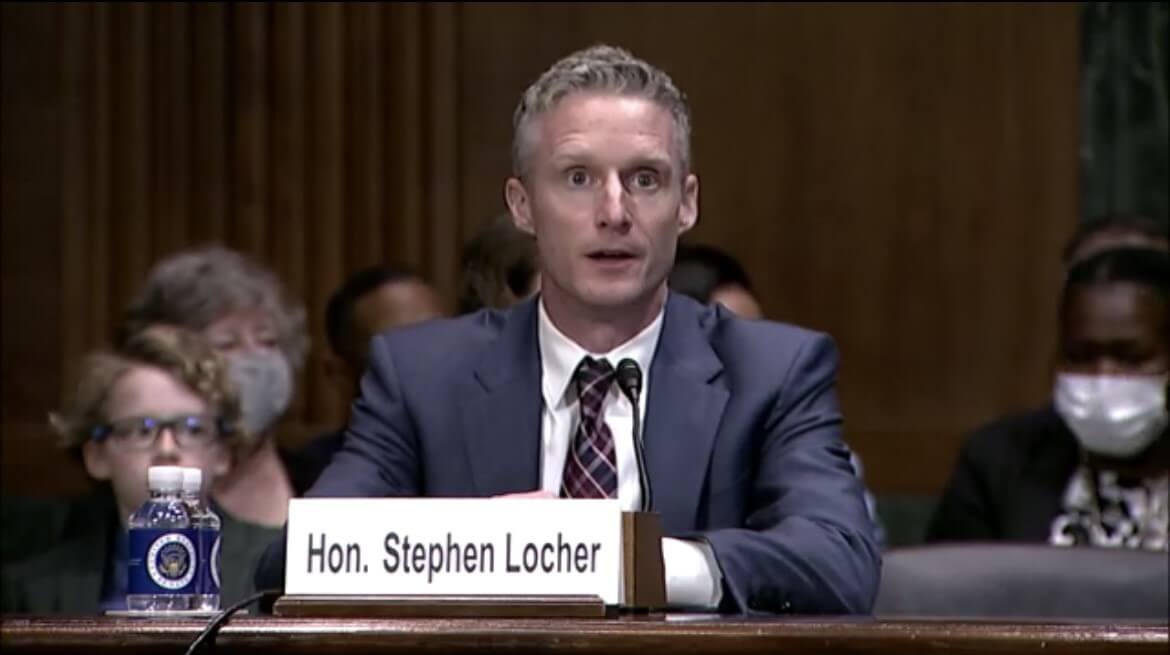US District Judge Stephen H. Locher issued a preliminary injunction against Iowa officials on Dec. 29 blocking enforcement of several parts of a recently-enacted law, Senate File 496, from going into effect. Signed into law on May 26, 2023, the statute is slated to require removal of books and other materials from school libraries if they include descriptions of “sex acts” and to ban any “programs, promotion and instruction relating to gender identity and sexual orientation” for students in grades K-6.
Anticipating the law’s effective date of Jan. 1, 2024, some Iowa school districts had already begun removing hundreds of books from library shelves, and elementary school teachers were preparing to alter curriculums and class decorations accordingly. Teachers who maintain library collections in their classrooms were also removing books that they believed would be covered by the law, since violations could subject them to criminal prosecution and penalties, and they were anticipating changes in their subject matter coverage and even in the way they would address students in their classes.
However, the court abstained from ruling on the constitutionality of a provision of the law that would require schools to notify parents if their children requested any “accommodation” relating to gender identity, such as asking to use different pronouns or names than those in school registration records.
Judge Locher found that the interpretation of the library and curricular provisions varied drastically across the state due to ambiguities in the statutory language and misinterpretations of the actual language of the statute, as well as statutory wording that was so vague and inconsistent with the stated purposes of the law as to defy the requirements of the 14th Amendment’s Due Process Clause. The problems with the law were compounded by guidance published by state agencies. At a hearing on the plaintiffs’ motion for a preliminary injunction, attorneys for the state struggled to challenge the broad interpretation of the law suggested by the plaintiffs, but the judge found that the state’s suggested interpretations were inconsistent with the statutory language and with recent US Supreme Court decisions purporting to rely on “textualism” as more important than “legislative intent” when interpreting statutes.
Judge Locher described the restriction on library content, based on the facts alleged by the plaintiffs, as “incredibly broad” and commented that it “has resulted in the removal of hundreds of books from school libraries” in anticipation of the law going into effect, “including, among others, nonfiction history books, classic works of fiction, Pulitzer Prize winning contemporary novels, books that regularly appear on Advanced Placement exams, and even books designed to help students avoid being victimized by sexual assault.” He asserted that the “sweeping restrictions in Senate File 496 are unlikely to satisfy the First Amendment under any standard of scrutiny and thus may not be enforced while the case is pending.” The judge remarked that he has been unable to locate “a single case upholding the constitutionality of a school library restrict even remotely similar to Senate File 496.”
Addressing the curricular provision of the law, he pointed out that “there appears to be a severe misunderstanding — in two different ways — by some of the parties about what Senate File 496 says,” due in part to vagueness of the statutory language and to overly generalized statements by legislators and in the media.
First of all, the curricular restrictions only apply to grades K-6. He pointed out that the law does not restrict the freedom of school districts to allow gay-straight alliances for students in grades 7-12, or to provide “resources and support for LGBTQ+ students” in those grades. Teachers and other licensed school personnel can continue to serve as faculty advisors for such groups, can display rainbow flags, and can provide instruction on LGBTQ history and rights. But, as noted above, the school libraries, and arguably, book collections maintained by teachers in the classrooms, may not include books on these subjects if they describe “sex acts.”
The second misunderstanding relates to the court’s “textualist” interpretation of the curricular provisions as they related to grades K-6. “The law forbids programs, promotion, and instruction to students in those grades relating to ‘gender identity’ and ‘sexual orientation,’ but those terms are defined in a neutral way that makes no distinction between cisgender or transgender identity or gay or straight relationships,” wrote Judge Locher. “Meaning,” he concluded, “on its face, the law forbids any programs, promotion or instruction recognizing that anyone is male or female or in a relationship of any sort (gay or straight). The statute is therefore content-neutral but so wildly overbroad that every school district and elementary school teacher in the State has likely been violating it since the day the school year started.” This makes it “void for vagueness” under the Due Process Clause.
The court didn’t address the merits of the provision requiring parental notification because it found that none of the transgender plaintiffs in the case had standing to contest it, as all of the individual transgender plaintiffs are already “out” to their parents and families and so are not personally affected by that provision. Thus, he concluded, as none of the trans plaintiffs in the case are personally affected, none of them have an actionable injury if that provision goes into effect, so they don’t have “standing” to challenge the provision in court. This means that a separate lawsuit brought by closeted trans students seeking to preserve their anonymity by suing under pseudonyms would be required to challenge that requirement, at least in Judge Locher’s court.
If the state files an appeal to stay or reverse the court’s preliminary injunction, its chances of succeeding at this may be quite high, because all but one of the active judges on the Eighth Circuit Court of Appeals are appointees of Republican presidents: four by President Trump, five by President George W. Bush, and one by President George H.W. Bush. The sole exception is a judge appointed by President Barack Obama. Even if an appeal goes to a three-judge panel that includes senior circuit judges or a judge from outside the Eighth Circuit appointed to sit by “designation,” the three senior Eighth Circuit judges who remain active to sit on appellate panels are all Republican appointees. Thus, any Eighth Circuit panel that gets the application of a stay or an appeal will have a majority of Republican-appointed judges. Judge Locher, by contrast, was appointed to the US District Court in Iowa by President Biden.
Judge Locher was actually ruling on motions for preliminary injunctions in two separate cases which he considered together because they both attack Senate File 496. One broader case was filed by an organization called “GLBT Youth in Iowa Schools Task Force” together with a handful of transgender students and their parents. The other case, focused mainly on the library issues, was filed by a publishing company, Penguin Random House LLC, and a collection of authors, students, parents, and the state’s teachers’ union.
The defendants, sued in their official capacities, are the governor of Iowa, president of the Iowa State Board of Education, the Director of the Iowa Department of Education, the chair of the Iowa State Board of Educational Examiners, and two local boards of education that have already been directing removal of books from their school libraries anticipating application of the statute.
































